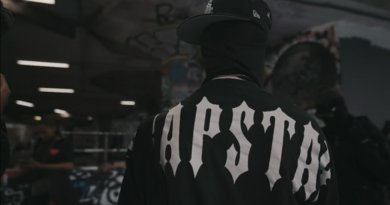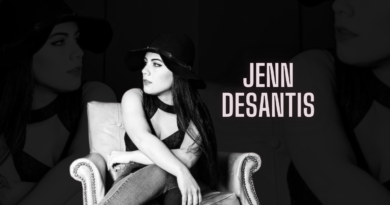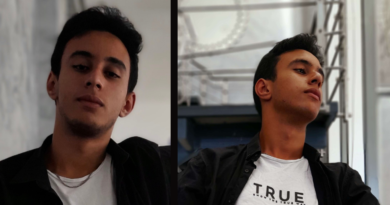Interview: Statz
When you talk to Statz, you don’t just hear an artist—you hear a mission. Straight out of Harlem, he’s crafting music that’s as thoughtful as it is raw, blending lyricism with real-life stories and soulful, self-produced beats that hit like truth bombs.
In this exclusive convo, we chopped it up about his journey from coping through rap to building the ForeverJiggy movement, producing for himself and others, and carving out a space that honors hip-hop’s roots while pushing it forward. It’s more than just bars—it’s purpose in every line.
Read on and get a deeper look into the mind behind tracks like “Topboy” and beyond.
Q – Where on the planet are you from and how old are you?
A – I’m from Harlem, New York—born and raised. I’m 32 now, and every year has added something to my story. Harlem gave me the grit, the style, the mindset. It’s where I learned how to move through life with rhythm and resilience.

Q – Can you break down how your journey as Statz started—what pulled you into hip-hop/Rap and made you pick up the mic?
A – Honestly, it started as a way to cope. Life was moving fast around me—losses, struggles, pressure—and I needed an outlet. I started writing to make sense of it all, and the more I wrote, the more I realized this wasn’t just therapy, it was purpose. Picking up the mic wasn’t a choice—it was a calling.
Q – What does the name Statz mean to you, and how did it come to represent your identity as an artist?
A -Statz is short for “statistics,” but to me, it’s deeper than that. It’s about beating the odds and turning pain into power. It’s a reminder of where I come from and how far I’ve come. When people hear “Statz,” I want them to feel truth, growth, and real energy.
Q – Tell us more about ForeverJiggy?
A – ForeverJiggy is my heart. It’s the home I built for creatives who want to keep it real but still elevate. It started as a production company, but now it’s a whole movement—helping independent artists create with freedom, quality, and purpose. It’s about staying jiggy forever—true to yourself, evolving, and never losing that spark.

Q – What was the moment you realized rap wasn’t just something you loved—it was something you had to do?
A – I remember being in the studio one night, just vibing, and I laid down a verse that hit different. It felt like everything I had bottled up finally had a place to live. That’s when I knew—I couldn’t just rap for fun anymore. This was deeper. This was survival. This was my truth—and I had to share it.
Q – Who were the first MCs or producers that made you fall in love with that real old-school sound?
A – Man, I gotta shout out Jay-Z, Nas and DJ Premier. That gritty storytelling, raw emotion, and soul in the beats—they made me see hip-hop as something sacred. It wasn’t just music; it was life being spoken out loud.
Q – How did growing up in your city or neighbourhood shape your sound and your mindset as a rapper?
A – Harlem shaped everything. The hustle, the fashion, the pride, the pain—it’s all in my sound. Growing up there taught me how to be sharp with my words, how to move with confidence, and how to make something out of nothing. That energy never left me.

Q – Was there a specific track, freestyle, or cypher that made you feel like “Yeah, I’ve arrived”?
A – There was this one track my cousin Glory Lives performed for an artist song showcase years back—It was a song I produced on with him. It was extremely different sonically from anything that was getting played back in 2015, but it got the attention of well established industry professionals such as Buddha The Future and DJ Envy on the panel. He won the song contest and $1500 prize money for the best performance and record out of +30 artists that night at Santos Party House in NYC. DJ Envy shouted him out and the song on Hot97 the very next day. That moment told me, “You got it. Keep going.”
Q – Who do you consider the GOATs in hip-hop—and how have they influenced the way you write, flow, or perform?
A – Jay-Z for his business mind and bars. 50 Cent for his fearless approach and confidence. Andre 3000 for how courageous he is creatively. Kendrick for the way he paints with words. They’ve all taught me different things—how to elevate my message, stay sharp lyrically, and never be afraid to evolve.
Q – When you sit down to write, what’s the first thing that sparks the bars—a beat, a line, a message?
A – Usually, it’s the beat. If the vibe is right, the words just start flowing. But sometimes, a phrase or emotion will hit me outta nowhere, and I gotta jot it down fast before it slips away.

Q – What inspires your lyrics—do you pull mostly from personal experience, storytelling, or social commentary?
A – A little of all three. My life experiences are the core, but I love telling stories too—things I’ve seen, heard, or imagined. And sometimes I gotta speak on what’s going on around me. Music is my mirror to the world.
Q – How important is it for you to keep lyricism front and center in your music?
A – It’s everything. Bars still matter. I want my words to hit, to stay with you, to make you run it back like, “Wait, what did he just say?” Lyricism is what makes a song timeless to me.
Q – Do you approach a track differently depending on whether it’s storytelling, braggadocious, conscious, or straight battle rap?
A – Absolutely. Each vibe calls for a different version of me. If it’s a story, I slow down, get cinematic with it. If it’s braggadocious, I’m popping my collar, having fun. I let the beat and message tell me who to show up as.
Q – How do you keep your rhymes sharp—do you still freestyle, write every day, or study the greats?
A – All of the above. I freestyle just to loosen up, I write almost daily—even if it’s just a few lines—and I’m always studying legends and even newer artists to see how they bend words, flip flows, and evolve their craft.

Q – What’s your take on rhyme schemes, cadence, and delivery—how much of that is instinct vs. craft?
A – It starts with instinct, but craft is what sharpens it. You might naturally ride a beat, but learning how to control your breath, switch cadences, or land a punchline right—that’s the part you train. I respect the art in all of it.
Q – Can you walk us through the making of a verse or track that you’re especially proud of?
A – “Please Don’t Break My Heart” comes to mind. That track came from a real place—heartbreak, reflection, letting go. It took an entire year to write it, alone, just me and the beat. Every word felt honest. By the time I recorded it, it wasn’t just a song—it was closure.
Q – What kind of beats speak to you the most—are you digging crate-style samples, boom bap drums, jazz loops?
A – I’m a sucker for soul samples and boom bap drums. Give me something with grit and feeling, and I’m in. But I’m open—I also love jazzy loops, modern bounce, and even minimalist beats if they leave space for the words to breathe.
Q – How involved are you in choosing or crafting the production behind your verses?
A – Very involved. I’m hands-on with everything. I like to be part of the process from scratch—picking sounds, tweaking drums, even guiding the energy of a track. If my voice is on it, it has to feel like me from start to finish.

Q – Do you work with a regular producer or do you like to jump around until you find that sound?
A – I’ve got a few go-to producers I really vibe with outside myself, but I also love discovering new sounds and collabing with different creatives. Sometimes that unfamiliar energy brings out something fresh in me.
Q – How do you balance that old-school feel with keeping your music fresh and relevant to today’s listeners?
A – It’s all about blending. I keep the soul and substance of what I grew up on, but I’m not afraid to update the sound. I study what’s current—not to copy, but to understand how to make my message hit in today’s landscape while putting my own spin on it.
Q – Have you ever experimented with modern sounds or styles, and if so, how do you keep your voice true in the mix?
A – Yeah, I’ve played around with melodic flows, trap drums, even some Alternative pop vibes. But no matter the style, I stay rooted in my voice, my story. That’s what makes it Statz, no matter the backdrop.
Q – What does performing live mean to you—how do you channel that raw energy on stage?
A – Performing live is where it all comes alive. It’s where I connect the most with people. I feed off the crowd’s energy, but I also bring my own. Every show feels like I’m giving a piece of my truth away—and that exchange is powerful.

Q – Do you have a favourite track to perform that always gets the crowd jumping or locked in?
A – “Topboy” always gets a reaction. It’s bold, it’s confident, and the beat slaps. As soon as it drops, people lean in, and I know it’s go time.
Q – Any crazy or unforgettable show memories that stand out?
A – One time I performed at a SOBs, and it was the biggest crowd I ever performed in front of. I had so many butterflies in my stomach, but I had my cousin on stage to hype me up—and the crowd started cheering and dancing with me. It turned into this unforgettable, fun, and beautiful moment I’ll never forget.
Q – What does hip-hop culture mean to you—not just the music, but the lifestyle, the movement, the roots?
A – Hip-hop is life. It’s how we talk, how we dress, how we think. It gave a voice to the voiceless and created something from struggle. It’s deeper than rap—it’s a way of seeing the world.
Q – How do you feel about the current state of hip-hop—what’s missing, and what gives you hope?
A – There’s a lot of talent out there, but sometimes the heart gets lost in the hype. What gives me hope is the new wave of artists who still care about the message, the pen, the impact. That realness is making a comeback.
Q – Do you feel a responsibility to carry that torch for classic hip-hop while carving your own lane?
A – 100%. I’m here because of those who came before me. I don’t want to copy them—I want to honor them by being the best version of myself. I’m building my own lane, but I carry that torch with pride.

Q – What role do DJs, graffiti, breakdancing, or street fashion play in your vision of hip-hop?
A – They’re all part of the DNA. I grew up around those elements. They remind me that hip-hop isn’t just music—it’s a culture, a movement, an ecosystem. It’s about expression in every form.
Q – How do you stay connected to the streets and the community while building your career?
A – By staying accessible. I don’t move like I’m above anyone. I still tap in with my people, pull up to local events, mentor when I can, and just stay grounded. My community built me—I’m never too far from it.
Q – What’s been your biggest challenge as an artist trying to keep it real in a game that’s constantly chasing trends?
A – The hardest part is staying true when everything tells you to switch up. But I remind myself—longevity comes from authenticity. Trends fade. Truth lasts.
Q – How do you stay motivated and focused when the industry can feel like it’s pushing in a different direction?
A – I focus on impact over hype. I think about the people who tell me my music helped them through something. That’s why I do this. That’s what keeps me locked in.
Q – What does success look like for Statz—is it money, respect, legacy, or something else entirely?
A – Success for me is legacy. I want my music to outlive me. Money’s cool, respect is necessary—but if my story inspires even one person to keep pushing, that’s everything.

Q – Have there been key moments that tested your commitment to this path—or made you level up?
A – Plenty. From financial struggles to self-doubt to industry politics. But each test made me sharper, more intentional. Pressure builds diamonds, and I feel like I’m just getting started.
Q – How do you protect your peace and stay grounded while grinding as an independent artist?
A – I check in with myself often. I take breaks when needed, surround myself with people who see me—not just “Statz”—and I stay rooted in my “why.” That keeps me sane and focused.
Q – If you could build your dream posse cut—like a ’90s cypher track—who’s on the mic with you?
A – Give me Black Thought, J. Cole, 50 Cent, Jay-Z, and Kendrick. That’d be a lyrical clinic.

Q – Are there any producers, DJs, or artists you’ve always wanted to collaborate with, old-school or new-school?
A – I’d love to work with 9th Wonder, Hit-Boy, Just Blaze or Metro Boomin. They each bring something different, but they all understand how to bring out the best in a storyteller.
Q – What kind of sound or project would you love to explore that fans might not expect from you?
A – I’d love to dive into a jazz-infused hip-hop EP—live instruments, spoken word vibes, maybe even some orchestration. Something soulful and cinematic.
Q – Do you have any visuals, short films, or creative concepts that go hand-in-hand with your music?
A – Definitely. I’ve always seen my music as visual. I’m working on a few short film-style videos that tell deeper stories behind the tracks. Think music meets cinema.

Q – What do you hope people feel when they hear a Statz track for the first time?
A – I hope they feel seen. I hope they feel something real. Whether it’s pain, pride, joy, or hunger—I want it to hit them in a way that lingers.
Q – What would you tell the younger version of yourself who was just starting to spit bars?
A – Keep going. Don’t let fear or outside noise make you second-guess your gift. Your words matter. Your story matters. Trust it.
Q – When it’s all said and done, what legacy do you want Statz to leave in the game?
A – I want people to say, “Statz kept it real. He spoke from the soul, stayed solid, and made music that mattered.” That’s the legacy I’m building.
Q – Is there anything you want to add that has not been included above?
A – Just gratitude. For the journey, for the people who listen, and for platforms like this that give space for artists to share their truth. I’m just getting started—and I’m hungry for more.

Statz Spotlight post
Read more about Statz on our Spotlight post by clicking HERE



